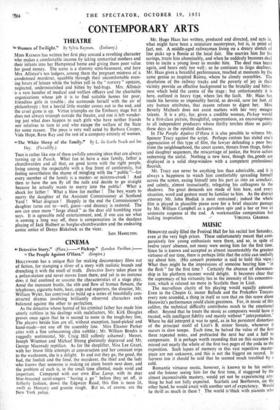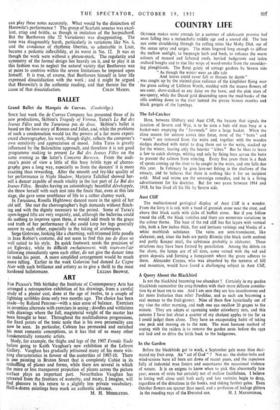MUSIC
Hoaowrrz easily filled the Festival Hall for his recital last Saturday, even at the very high prices. These unfortunately meant that com- paratively few young enthusiasts were there, and so, in spite of twelve years' absence, not many were seeing him for the first time. Since he is known and accepted as almost incontestably the greatest virtuoso of our time, there is perhaps little that the critic can usefully say about him. (His concert promoter is said to hold this view.) What then might be the impressions of someone hearing him " in the flesh " for the first time ? Certainly the absence of showman- ship in his platform manner would delight. It becomes clear that the supremacy of his virtuosity lies in the intensity of his concentra- tion, which is relaxed no more in Scarlitti than in Liszt.
The marvellous clarity of his playing would equally astound. Even in the Chopin G. minor Ballade and the Prokofiev Toccata every note sounded, a thing in itself so rare that on this score alone Horowitz's performance could claim greatness. For, in music of this calibre, the technical difficulty contributes much to the emotional effect Beyond that he treats the music as composers would have it treated, with intelligent fidelity and mainly without " interpretation." Where he did interpret it was to spoil, as in his persistent distortion of the principal motif of Liszt's B. minor Sonata, whenever it occurs in slow tempo. Each time, he halved the value of the first three repeated notes, and prdtracted the next bar and a half to compensate. It is perhaps worth recording that on this occasion he Missed out nearly the whole of the first two pages of the coda to the exposition. Such lapses of memory in this vast repetitive master- piece are not unknown, and this is not the biggest on record. In fairness too it should be said that he seemed much troubled by a cold.
Romantic virtuoso music, however, is known to be his métier, and the listener seeing him for the first time, if staggered by the almost inconceivable mastery, would yet not be experiencing any- thing he had not fully expected. Scarlatti and Beethoven, on the other hand, he would await with another sort of expectancy. Would he thrill as much in these ? The world is-thick with pianists who can play these notes accurately. What would be the distinction of Horowitz's performance ? The group of Scarlatti sonatas was excel- lent, crisp and brittle, as though in imitation of the harpsichord. But the Beethoven (the 32 Variations) was disappointing. The tone was disagreeably harsh, particularly in variations like No. and the avoidance of rhythmic liberties, so admirable in Liszt, became a pedantic inflexibility, at its worst in No. 12. It was as though the work were without a phrase-mark. The regularity and symmetry of the formal design lies heavily on it, and to play it in this fashion was to neglect the natural variety that Beethoven was at pains to contrive within the severe limitations he imposed upon himself. It is true, of course, that Beethoven himself in later life expressed dissatisfaction with the work ; and it might be argued that Horowitz's is the authentic reading, and that therein lies the



































 Previous page
Previous page